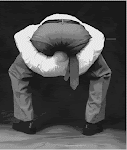So far on this wearying series we've covered Boogie Nights, the definitive story of the porn business, and Adaptation, the definitive story of a socially inept writer putting a fictionalized version himself in his screenplay and ending it with an ironic deus ex machina (this is a pretty short list).
With this entry, however, it's time to change it up again. Instead of actors and writers, we'll focus on on a movie about that most loathsome Hollywood character -- the Producer.
The Bad and the Beautiful (1953)
Like this, only in Hollywood. (Ok ok, it's nothing like this. Except sort of)
Based on the lives of a number of real Hollywood people (but especially David O. Selznick), The Bad and the Beautiful is the story of Jonathan Shields, an asshole producer played by Kirk Douglas, tracking his rise to fame as the son of a director who'd been such a prick Douglas had to hire extras to come to his funeral.
Determined to dominate Hollywood, Shields starts by manipulating a low budget producer (Walter Pidgeon) into letting him and a director friend, Fred Amiel (Barry Sullivan), work for him. They work on a number of weird low budget movies (one of which mimmicking the real life Cat People) After a while -- and a few hits -- Amiel decides he's ready to direct his dream project, and Shields goes off to make a deal.
Which he does -- with a big studio and a big budget. The only catch? Shields allows Amiel to be replaced with a more experienced director as long as he still gets to produce.
Next, Shields comes across the alcoholic daughter of an actor he admired, Georgia Lorrison (played by Lana Turner). Shields realizes she has talent, builds up her confidence, and shoehorns her into a movie over everyone's objections. He even lets her fall in love with him because he believes it'll help her performance. But after the movie's a hit she finds Shields with another woman. When she confronts him, he rejects her, telling her he doesn't want anyone having the kind of control a true romance would mean over him.
Next, Shields finds a novel he wants to make into a movie that's been written by James Lee Bartlow (Dick Powell). The only problem? Bartlow's pea-brained high-maintenance Southern Belle wife (Gloria Grahame, who won an Oscar), who constantly distracts Bartlow from his work.
His douchebag instinct kicking in, Shields sends a well known movie star seducer after Bartlow's wife. Once she's gone (Bartlow thinks on vacation), Bartlow finishes his script easily, but when she and the movie star try to run away together, they die in a plane crash. Bartlow is distraught, and in a moment of weakness, Shields confesses his involvement. Bartlow punches Shields out and leaves (leaving behind the script, which turns into a hit).
Anyhow, the movie begins with these three: Amiel, Lorrison, and Bartlow, now at the top of their professions (the movie is told in flashback), while Shields has become bankrupt after directing a movie that ended up a monumental piece of shit and he refused to release it.
Shields wants to make a movie with them. Will they help?
In each case they're asked to reflect on the fact that, though Shields definitely screwed them over, he also made their careers. Without Shields, Amiel would have never gotten a break as a director. Shields brought Lorrison out of alcoholism and into movie stardom. And now that his wife isn't around, Bartlow is producing hit novel after hit novel (his first had taken seven years).
And that's the handle, I think, and what makes it a great movie about the movies. Sure, people get screwed over in Hollywood. And yeah, there are a lot of examples of amoral shit-kicking world-beaters who roll over mere mortals in their path like bugs. But these people have to ask themselves: are they really worse off because Shields was a part of their lives?
After the Pidgeon character makes his final pitch, the three characters sit there and think about it. And their collective answers, and what happens after -- which I won't reveal -- says a lot about that fine balance between business and the personal that the movie business seems to test at all times.
In addition to all that, The Bad and the Beautiful is one of the great portrayals of the kind of personality you need to be a successful producer. Louis B. Mayer, the head of MGM, upon whom Shields is partly based, was widely regarded as -- even more than stars like Spencer Tracy and Greta Garbo -- the best actor at MGM. He cajoled, screamed, cried and fainted -- sometimes in the same conversation -- if that's what it took to get what he wanted.
One famous example involved actor Robert Taylor, who came into Mayer's office early in his career to get a raise. Instead of saying "yes," or even "no," Mayer told Taylor to work hard, respect his elders, and in due time he'd get everything he deserved. Then Mayer hugged Taylor, cried, and showed him to the door. Asked afterwards whether he'd gotten his raise, Taylor said, "no, but I found a father," and proceeded to spend the next 25 years as one of the most underpaid actors on the MGM lot.
The Bad and the Beautiful touches on all of that. Shields takes people into the sphere of his magnetic personality and for as long as he needs them, he's as good and dynamic a friend as you could ask for.
But when he's done with you, he's done. And in that he personifies all of Hollywood. Ask an actress approaching 40 what happens to offers. Ask a director who makes a flop. It's the name of the game.
The Bad and the Beautiful (terrible title and all) is the warning.




















